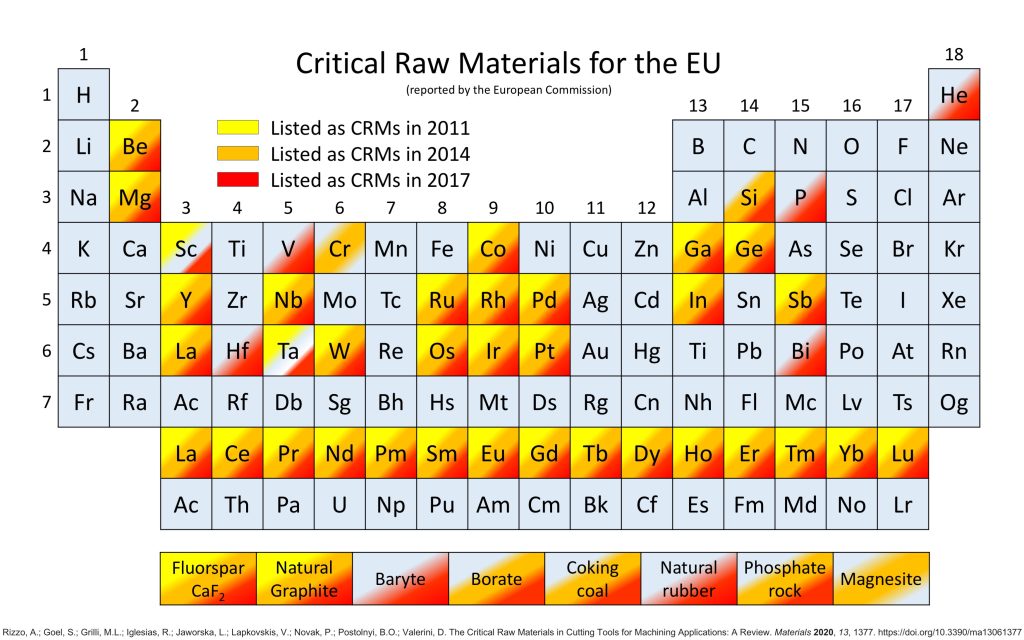
The critical raw materials, or critical raw materials in English, are a group of raw materials considered essential for the economy and industrial sectors of a country, but which present a high risk of supply. The main ones are Rare Earths (Rare Earth Elements – REEs), cobalt, lithium, platinum group metals (Platinum Group Metals – PGMs) and rare metals (for example, tungsten, tantalum, niobium). These raw materials are essential for several industries, including technology, renewable energy, aerospace, defense and electric mobility. The criticality of these raw materials arises from several factors, like scarcity, geopolitical issues, limited availability or importance to strategic industries.
Critical raw materials have global strategic importance due to their fundamental role in essential economic and technological sectors. These raw materials play a crucial role in the viability and development of various industries and the economic security of countries.. Below are some of the reasons that highlight the global strategic importance of critical raw materials:
- High technology industries: Critical raw materials are fundamental to the functioning and production of a wide range of advanced technologies. They are essential for the manufacture of electronic devices, energy storage batteries, electric vehicles, renewable energy systems, communication equipment, among others. The dependence of these industries on critical raw materials makes these resources of great strategic importance.
- Security and defense: Critical raw materials are vital to the defense and security sector. They are used in the manufacture of military equipment, armaments, communication systems, advanced sensors and defense technologies. Lack of access to these raw materials can compromise a country's ability to maintain its national security and defense.
- Transition to clean energy: With the growing demand for renewable energy and the transition to a low-carbon economy, critical raw materials have become even more crucial. They are necessary for the production of green technologies, like solar panels, wind turbines and energy storage batteries. Lack of access to these raw materials can affect countries' ability to adopt sustainable energy solutions.
- Economic competitiveness: Critical raw materials can confer significant competitive advantages on nations that have access to abundant resources or efficient extraction technologies. Control of these raw materials can influence economic dynamics and geopolitical power between nations.
- Dependence on external suppliers: Many countries depend on external suppliers for critical raw materials, which creates vulnerabilities in the supply chain. Political instability, conflicts, Export restrictions and price fluctuations can significantly affect the availability of these raw materials. This highlights the strategic importance of diversifying supply sources and investing in research and development to find alternatives or substitutes..
In view of these factors, The search for security of supply and the adoption of critical raw materials management strategies have become a growing concern for many countries and international organizations. Developing a resilient and sustainable supply chain for these raw materials is critical to ensuring economic stability, technology and defense worldwide.
Brazil plays a significant role in the production of several critical raw materials. The country has vast mineral resources and is an important global supplier of materials such as iron ore, niobium, tantalita, graffiti, among others. When we analyze its international position in relation to the production of critical raw materials, we can highlight the following:
- Exploration and export: has a developed mining industry, which explores and exports a wide range of critical raw materials. Brazilian companies play a fundamental role in supplying these materials to international markets.
- Development strategy: has pursued development strategies to increase its participation in the global value chain of critical raw materials. The country seeks to invest in research and development, innovation and processing technologies to add value to mineral resources and reduce the export of low value-added products.
- International partnerships: seeks to establish partnerships and cooperation with other countries for the production and development of critical raw materials. For example, the country has collaborated with countries such as Canada and Australia on research and development initiatives, in addition to seeking partnerships with international companies to boost the value chain of these resources.
- Sustainability and social responsibility: has emphasized the importance of sustainability and social responsibility in the production of critical raw materials. The country has implemented environmental regulations and standards to ensure responsible and sustainable mining practices, including respect for human rights and protection of the environment.
- Market diversification: has sought to diversify its export markets for critical raw materials, seeking to expand into new regions and reduce dependence on a single market. This is done to increase economic resilience and ensure access to different buyers and consumers of these resources.
The economic and geopolitical relevance of critical raw materials makes it important for Brazil to guarantee autonomy in its production capacity and global supply.. Like this, at the same time that Brazil must enter global production and supply chains, must seek to keep its supply possibilities open, not becoming dependent on just one chain.
